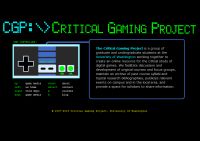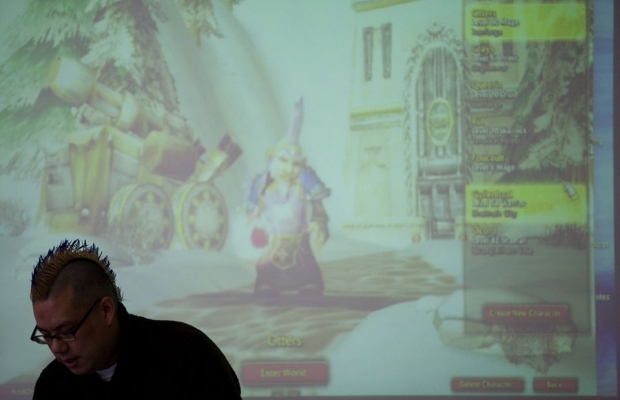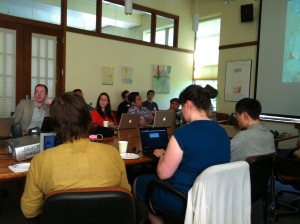Critical Gaming Project @ UW
In 2008, I was invited to join the organizing committee of the Critical Gaming Project (CGP) at the University of Washington. Originally started by Terry Schenold as a clearinghouse for teaching with and teaching about video games, the CGP has grown over the years into an interdisciplinary “collaboratory” for video game studies, research, and pedagogy. I worked with Terry Schenold and Timothy Welsh to revamp the CGP website into a blog to provide a more public face to the work being done on games at UW. I regularly contributed gaming research news, commentaries, and course offerings. Working with the Comparative History of Ideas department, the CGP organized a series of two-credit focus groups on critical approaches to video games. I developed five of these CHID courses specifically on video games and two on other gaming forms like pen-and-paper RPGs and live-action role-playing games.
Because of our work, the CGP successfully garnered funding from the Simpson Center for the Humanities to organize a Graduate Interest Group (GIG) called Keywords for Video Game Studies. I was the lead organizer of the Keywords GIG, which organized a series of public conversations and workshops to promote critical play and critical gaming. Moreover, all of the GIG collaborators were named Humanities, Arts, Science, and Technology Advanced Collaboratory (HASTAC) scholars for 2010. As of this year, the GIG has been renewed for 2011-12 and renamed HASTAC Scholars.
I continue to work with the CGP and its various projects. Through the CGP and the Keywords GIG, I have learned how to enter into conversations in the digital humanities and video game studies, how to leverage technology and collaboration to promote my work, and how I locate myself as a public scholar, researcher, and teacher. I have also gained useful experience in writing proposals, in working with an organization like the Simpson Center, and developing an online, academic presence.
Project Description
The Critical Gaming Project (CGP) at the University of Washington is a collaborative, interdisciplinary working group and community of players dedicated to the critical study and teaching of games, primarily digital and social games. The CGP is committed to the idea that video games (and games in general) occupy an important part of our lives and media ecology, that games can be *both* “serious” and “fun,” and that games are necessary objects of inquiry and analysis. The CGP hopes to foster game research and pedagogy at the university level and to develop productive interactions between departments, disciplines, scholars, players, fandoms, and the general public.
To accomplish these objectives, the CGP maintains a collective blog and web archive, networks to like-minded programs and projects at other universities and institutions, develops original courses and focus groups on games at UW, promotes and publicizes gaming events on campus and beyond, and provides an intellectual and avocational space for scholars, teachers, and players to share their work and their interests. The CGP includes graduate students, undergraduates, and faculty.
Membership and participation in the CGP is ad hoc. The current organizing committee consists primarily of graduate students at the University of Washington, but anyone affiliated with the UW community may “join” the CGP and register as a subscriber of the Critical Gaming Project blog. For more specific roles, responsibilities, and privileges, please contact the CGP or attend a CGP meeting or event.
Critical Gaming Courses
Since 2008, after joining the Critical Gaming Project, I have taught a number of courses on critical gaming. First, working with the Comparative History of Ideas (CHID) department, I developed two-credit CHID 496 focus groups on video games and role-playing games. These focus groups are designed for special topics, student-driven exploration, and seminar-style discussion. According to CHID, “Focus Groups often begin when a couple of students want to do reading on a particular topic, and discuss ideas with others who share this interest…Focus groups allow students with common interests to create a space to discuss topics which may not be covered elsewhere in the UW undergraduate curricula. As with all CHID courses, all students participating in focus groups are expected to engage topics critically, respectfully, and from varying perspectives.” Second, I have also designed a five-credit ENGL 207 class for the English Department called “Virtual Worlds & Video Games.” ENGL 207 is an introductory cultural studies course and my class uses the occasion of virtual worlds and video games in literature, film, and new media to introduce students to the key concepts and terms of cultural studies.
I have learned a great deal about creating syllabi with video game texts, deploying digital media in the classroom, about developing new practices and pedagogies to teach games, and about collaborative teaching. For example, when Timothy Welsh and I drew up our first class on Irrational Games’s blockbuster Bioshock, we wanted to engage the game’s use of Ayn Randian themes and theories about posthumanism and technolibertarianism. However, from the first day, we met with immediate resistance from the students, who simply wanted to play the game and to talk about how to best beat the game. Our attempts to connect the game to real world issues or theories was seen as “reading too much into things” and “taking the fun out of play.” We realized that just because students like video games does not mean they are prepared or willing to treat them as objects of analysis (a fact that challenges popular notions of “digital natives”). Therefore, our next focus group would foreground games with overt “messages” and goals. The tensions and resistances of our Bioshock class became the very questions and inquiries for our “Why So Serious?” class on persuasive and propaganda games. Putting questions of why video games are important and how do you approach video games critically resulted in a much more rich and successful class. Finally, in this arc, we returned to Bioshock and taught a class on “close playing,” teaching students a methodology for critically looking at and playing games. For more information, see the individual course descriptions and syllabuses linked below.
Video Game Courses
- CHID 496: “Bioshock: Cyborg Morality and Posthuman Choice.” Co-taught with Timothy Welsh. Autumn 2009.
- CHID 496: “Why So Serious?: Video Games as Persuasion, Politics, and Propaganda.” Co-taught with Timothy Welsh. Winter 2010.
- CHID 496: “Keywords for Video Game Studies.” Co-taught with Timothy Welsh. Autumn 2010.
- CHID 496: “Close Playing, or Bioshock as Practicum.” Co-taught with Timothy Welsh. Winter 2011.
- ENGL 207: “Virtual Worlds and Video Games.” Winter 2009 & Spring 2010.
- CHID 496: “Video+Games+Other+Media.” Co-Taught with Sarah Kremen-Hicks. Winter 2012
Other Gaming Courses
- CHID 496: “Paper & Dice 101: Tabletop Gaming as Storytelling, Storyplaying.” Autumn 2008.
- CHID 496: “Heroes & Monsters: Understanding Live-Action Role-Playing.” Spring 2009, 2010, 2011, 2012, & 2013.
Press
- “Get Your Game On” by Eric Staples. The Daily of the University of Washington. March 6, 2009.
- “Heroes And Monsters: Live-Action Role-Playing Comes to Life at UW” by Kevin Wong. The Daily of the University of Washington. June 2, 2010.
- “The Pedagogy of Gaming” by Mark Cooper. Columns: The University of Washington Alumni Magazine. March 2011.
- “The Poetics of Play” by Sean Sullivan. The Daily of the University of Washington. December 8, 2010.
Keywords for Video Game Studies
The Keywords for Video Game Studies “project” represents a collection of interconnected and interrelated pieces that argue that video game scholarship and research still needs to establish a working vocabulary. Inspired by Raymond Williams’s Keywords and the recent Keywords for American Cultural Studies, I wanted to think about how to go about defining and delimiting the key terms of video game studies. A book project is in the works, but in the meantime, I found other venues and opportunities to generate ideas, conversation, and collaboration:
- Keywords for Video Game Studies Roundtable
- Keywords for Video Game Studies Graduate Interest Group
- Keywords for Video Game Studies Focus Group Course
Keywords Roundtable
I helped organize for the Cultural Studies Association Eighth Annual Conference held at UC Berkeley in March 2010. The roundtable featured Timothy Welsh, Alenda Chang, and myself and provided a discussion space at the conference to talk about the emerging “field” of video game theory and scholarship with particular attention to video games as cultural productions. We felt that the roundtable format–rather than presenting traditional papers–would encourage the free flow of ideas and allow for a more organic and emergent discussion of terms like avatar, code, community, economy, environment, exploit, gender, immersion, narrative, platform, play, power, and sexuality. The roundtable was incredibly successful–one of the best conference experiences in my career–with a standing room-only room and lively conversation. It definitely pointed out a need for commonplaces in the field.
Description
Given the recent proliferation of video games, playership of video games, art and film inspired by video games, and most recently scholarship on video games, the moment is ripe for interrogating this growing medium, art form, and cultural production and to produce a critical vocabulary for their analysis and discussion. Alexander Galloway in Gaming: Essays on Algorithmic Culture argues that play “is a symbolic action for larger issues in culture” and that video games “render social realities into playable form.” In other words, what might video games reveal about the world we live in, about the culture that produces them, consumes them, and plays them? Moreover, how do we talk about them, write about them, think about them? This roundtable will bring together interdisciplinary perspectives to meditate and articulate the in- and out-of-game richness and complexity of video games, particularly massively multiplayer online (MMOs) games and sandbox games like World of Warcraft, Second Life, Grand Theft Auto, and Bioshock. To relegate video games to the category of pop culture or low art or juvenile pastime can result in the mistaken conclusions that games (unlike other established media) do not reflect, represent, challenge, or critique society, culture, identity, or ideology. This roundtable hopes to bolster the critical engagement with video games and video game culture to address the design of games (as computational, protocological, and rhetorical artifacts), the theorizing of games (looking at narrative, interactivity, race/gender/sexuality), and the pedagogical and political potential of games. Through close readings of games, real-time demonstrations and close playings of games, and discussion, this roundtable hopes to limn central questions, keywords, and even dissonances in video game studies and video game theory.
Keywords Graduate Interest Group
The Keywords for Video Game Studies Graduate Interest Group (GIG) grew out of the CSA roundtable above. After CSA, Timothy Welsh and I decided that we wanted to develop a similar space for conversation and connection at the UW. We knew that there were a number of people–faculty, grads, and undergraduates–working on and interested in gaming, but there was no centralized department or home for video game studies. Therefore, I drafted the initial proposal for support from the Simpson Center for the Humanities and brought together four other scholars representing English, Learning Sciences, and Comparative Literature. As a group, we organized a series of discussion groups and workshops to talk about topics such as “play,” “immersion/interactivity,” “avatar,” and “pedagogy.” These public events were very successful, often drawing 20-30 attendees, and provided much needed opportunities for networking, collaboration, and overall visibility. Because of our commitment to new forms of digital scholarship, the Keywords GIG has been named Humanities, Arts, Science, and Technology (HASTAC) Scholars by the Simpson Center in 2010-11 and 2011-12.
Description
In 2000, Henry Jenkins wrote, “The time has come to take games seriously as an important new popular art shaping the aesthetic sensibility of the 21st century,” that video games do matter. But only within the last few years has the state of video game studies, either popularly or academically, found legitimacy and critical attention, pointedly the recent John D. and Catherine T. MacArthur Foundation Digital Media & Learning Initiative, which “aims to determine how digital media are changing the way young people learn, play, socialize and participate in civic life.” Given this recent proliferation of video games, playership of video games, video game technology, art and film inspired by video games, and scholarship on video games, the moment is ripe for interrogating this growing medium, art form, and cultural production and to produce a critical vocabulary for their analysis and discussion. After all, Alexander Galloway in Gaming: Essays on Algorithmic Culture argues that play “is a symbolic action for larger issues in culture” and that video games “render social realities into playable form.” In other words, why are video games important as historical, aesthetic, political, poetic, mass media objects? What might video games reveal about the world we live in, about the culture that produces them, consumes them, and plays them? Moreover, how do we talk about them, write about them, think about them?
Drawing inspiration from Raymond William’s influential Keywords: A Vocabulary of Culture and Society and the new Keywords for American Cultural Studies book and website, our graduate interest group hopes to lay the groundwork for a similar project, “Keywords for Video Game Studies.” The Keywords for Video Game Studies working group proposes to identify and interrogate the key terms, the key moves, and the key players in video game studies. Williams argued, “I have emphasized this process of the development of Keywords because it seems to me to indicate its dimension and purpose. It is not a dictionary or glossary of a particular academic subject. It is not a series of footnotes to dictionary histories or definitions of a number of words. It is, rather, the record of an inquiry into a vocabulary: a shared body of words and meanings…” Our working group is dedicated to collecting and contributing to a video game studies shared body of words and meanings.
Our graduate interest working group will bring together interdisciplinary perspectives to engage with and articulate the in- and out-of-game richness and complexity of video games, including games like World of Warcraft, Second Life, Grand Theft Auto, The Sims, and Bioshock. Our working group hopes to bolster the critical engagement with video games and video game culture to address the design of games (as computational, protocological, rhetorical, and aesthetic artifacts), the theorizing of games (looking at narrative, interactivity, race/gender/sexuality), and the pedagogical and political potential of games. Through close readings of games, real-time demonstrations and close playings (critical gaming), and discussion, our working group hopes to highlight central questions, keywords, and even dissonances in video game studies and video game theory.
Our framing questions include:
- What key terms and core concepts animate the field of video game studies?
- How has the development of these terms and concepts shaped the field?
- In what ways do these terms and concepts provide a foundation for further video game scholarship?
- What are the central tensions, challenges, and antagonisms in video game studies?
- How do we as students, scholars, and game players shape the future of video game studies, video game development, and video game pedagogy?
The Keywords for Video Game Studies working group, in collaboration with the Critical Gaming Project at the University of Washington and the Humanities, Arts, Science, and Technology Advanced Collaboratory (HASTAC), is supported by the Simpson Center for the Humanities.
Press
The Keywords GIG has been featured in several publications:
- “The Pedagogy of Gaming” by Mark Cooper. Columns, The University of Washington Alumni Magazine. March 2011.
- “Game On: New Graduate Interest Group Promotes Serious Study of Video Games” by Peter Kelley. UW Today. October 2010.
THATCamp Epic Play 2013
I worked as co-lead with Theresa Horstman to renew the Keywords GIG for 2012-13. The group gained two new scholars, one from English and one from Sociology. This year’s keywords include “violence,” “history,” “bodies/sex,” fantasy,” and “close/distant.” This year’s Keywords group will expand the end-of-year colloquium to the THATCamp (The Technology and Humanities Camp) format. I am the lead organizer for THATCamp Epic Play 2013, an “unconference” on video game studies, gaming cultures and communities, and different kinds of game and play.
Keywords Focus Group Course
In Autumn 2010, as part of the first quarter of the Keywords for Video Game Studies GIG, we ran a concurrent two-credit focus group course for undergraduates through the Comparative History of Ideas (CHID) department. CHID 496: “Keywords for Video Game Studies” was co-taught by me and Timothy Welsh and introduced students to the general landscape of video game scholarship and research. The hope for the course was to get students interested in more than just playing games for fun–particularly those students who self-identify as wanting to become game developers and designers and artists–and to give them the first tools for critical gaming. Part of the requirements of the class was to attend the Keywords GIG sessions. I believe that the quarter was successful, and let us situate our own intellectual and critical positions in the field as the students discovered theirs.
Course Description
IN 2000, HENRY JENKINS WROTE, “The time has come to take games seriously as an important new popular art shaping the aesthetic sensibility of the 21st century,” that video games do matter. But only within the last few years has the state of video game studies, either popularly or academically, found legitimacy and critical attention, pointedly the recent John D. and Catherine T. MacArthur Foundation Digital Media & Learning Initiative, which “aims to determine how digital media are changing the way young people learn, play, socialize and participate in civic life.” Given this recent proliferation of video games, playership of video games, video game technology, art and film inspired by video games, and scholarship on video games, the moment is ripe for interrogating this growing medium, art form, and cultural production and to produce a critical vocabulary for their analysis and discussion.
OUR FOCUS GROUP, as part of a continuing series on video games generated by the Critical Gaming Project at UW, will draw inspiration from Raymond William’s influential Keywords: A Vocabulary of Culture and Society and the new Keywords for American Cultural Studies book and website to identify and interrogate the key terms, the key moves, and the key players in video game studies. We will play a range of games alongside formal video game and cultural studies scholarship in order to investigate keywords like: play, control, immersion, interactivity, identity, avatar, violence, casual, hardcore, race, gender, sexuality, nation, and economy.
THE COURSE will meet once a week for 2 hours to engage reading, guided discussion, analytical and reflective writing, and game play. This course coincides with the inauguration of the Keywords for Video Game Studies graduate interest group sponsored by the Simpson Center for the Humanities. Students will be required to attend two working group sessions in lieu of two, regular class periods. Students will be asked to participate in discussions both in class and online, write a review of a video game of their choice, and make a short in-class presentation.
Course Website
http://www.timothyjwelsh.com/courses/496fa10/
Other Courses
For more information about the other video game studies courses I developed and taught, go to the “Critical Gaming Courses” section of my portfolio.
HASTAC Scholars
I have been nominated and sponsored as a HASTAC Scholar by the Simpson Center for the Humanities at UW for the past four years now. HASTAC (“haystack”) is a consortium of individuals and institutions interested in and inspired by the possibilities that new technologies offer how we learn, teach, communicate, create, and organize communities. HASTAC is dedicated to interdisciplinary and collaborative work between the humanities, arts, sciences, and technology. The HASTAC Scholars fellowship program invites primarily graduate students to report on their work and on the work happening on their campuses, to network with the online HASTAC community and with their local communities, and to develop and contribute to regular discussion forums on the HASTAC web site. To date, it has been a fruitful and intellectually-engaging experience to see and interact with the breadth and depth of work being done by other graduate students and scholars. It has been important for me to join, navigate, and collaborate with different communities within and outside of the UW.
In 2009-10, I contributed to conversation series entitled “What Does Digital Scholarship Do?” that brought together HASTAC Scholars at UW from a wide array of disciplines to present their work at the Simpson Center. I organized a co-sponsored session called “Queer/ing/s Online” between the HASTAC Scholars and the Queer+Public+Performance graduate working group presented on “Playing and Queering World of Warcraft.” I also helped put together an online forum for HASTAC called “Democratizing Knowledge,” serving as moderator, commenter, and collaborator.
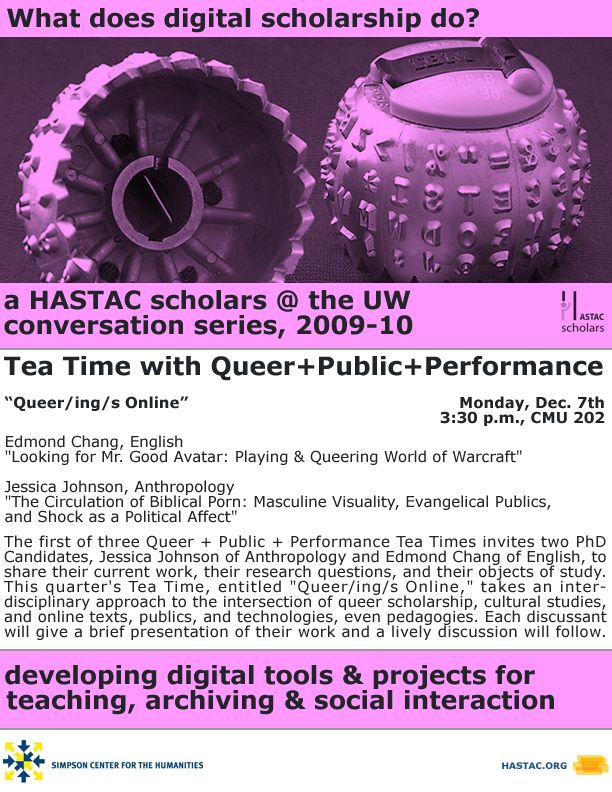
In 2010-11, I organized a graduate interest group called “Keywords for Video Game Studies,” bringing together graduate students from various departments interested in critical approaches to video games. On top of receiving funding for the group from the Simpson Center, I proposed that all of the graduate students in the group also be nominated and sponsored as HASTAC Scholars. I served as lead organizer for our year-long series of discussion groups and workshops on key terms like “play,” “avatar,” and “immersion/interactivity,” culminating in a one-day “Gamer+Gamification” colloquium.
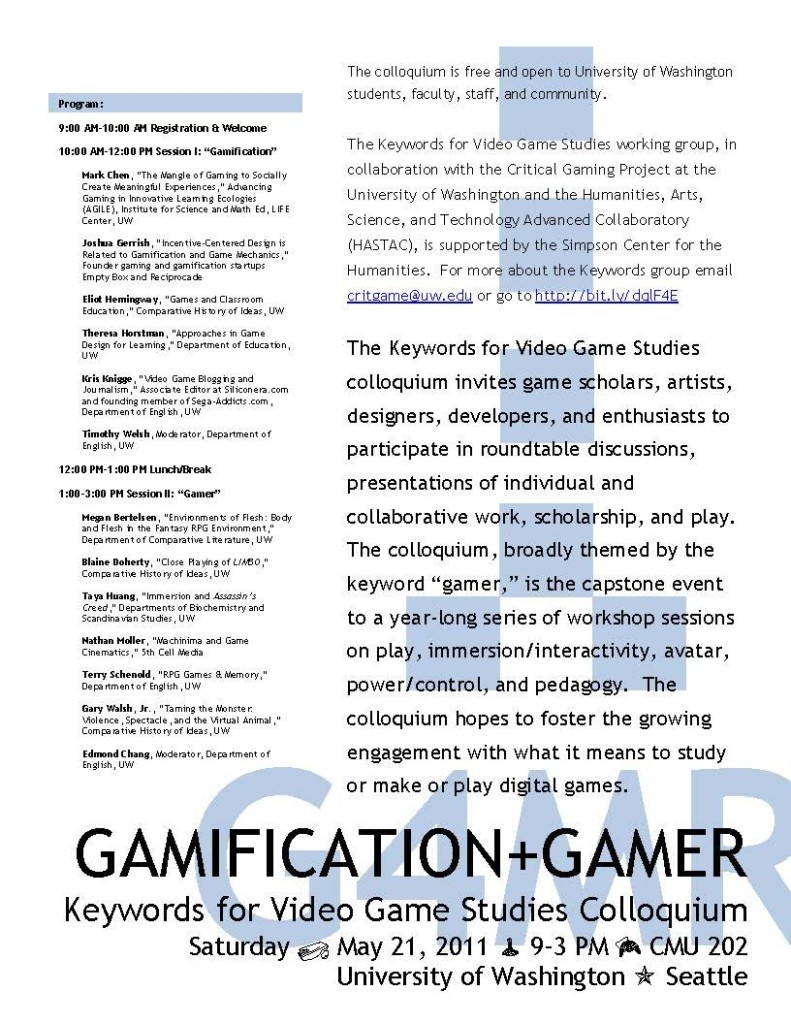
In 2011-12 year, I continued to lead the Keywords GIG, which was renewed by the Simpson Center, and we continued to represent the UW as HASTAC Scholars that year. The group helped write, organize, and publish an online forum via the HASTAC website entitled “Press Start to Continue: Toward a New Video Game Studies,” which was featured February/March 2012. And in our second year, we tackled key terms like “democracy,” “time,” and “gold farming,” ending in a second end-of-year colloquium on “Research/Design.”
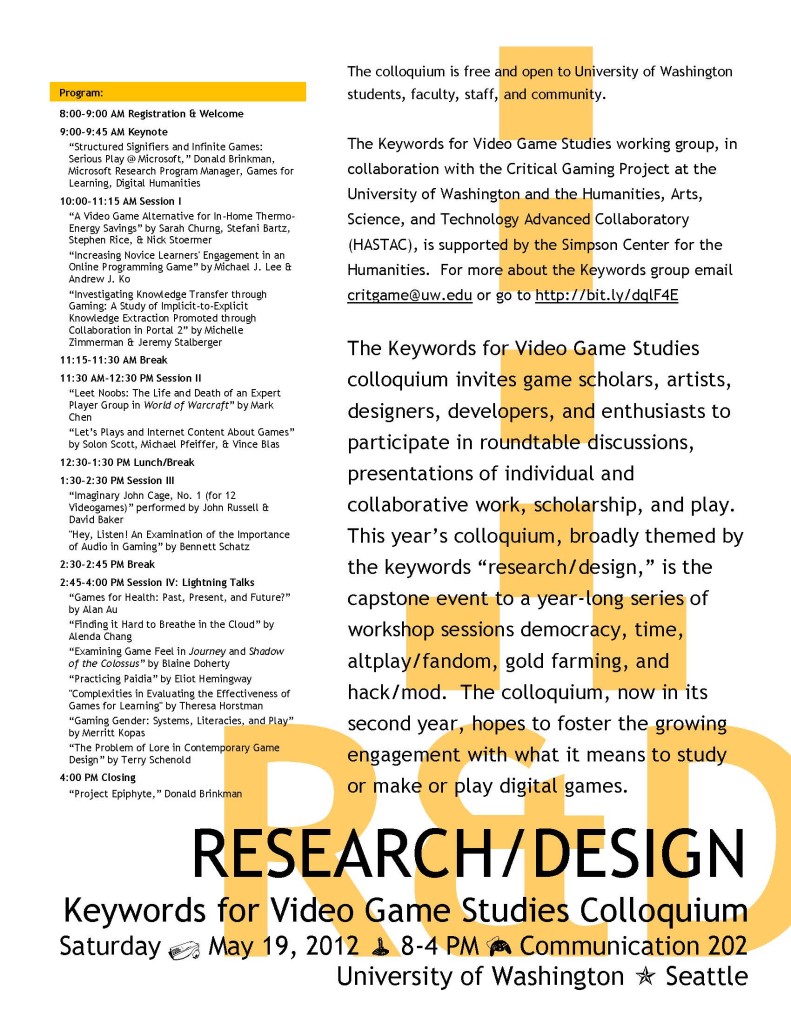
For the 2012-13 academic year, I will continue to serve as a HASTAC Scholar and to help the Simpson Center develop its digital humanities initiatives. In March 2012, HASTAC Scholars “crowdsourced” and published online an academic book review of Race After the Internet (Eds, Lisa Nakamura and Peter Chow-White). I reviewed Chapter 12: “Roots and Revelation: Genetic Ancestry Testing and the YouTube Generation” by Alondra Nelson & Jeong Won Hwang. I also helped write and organize another HASTAC forum entitled “Alan Turing: The First Digital Humanist?,” which was featured February/March 2013. In the spring, the HASTAC Scholars also held a roundtable called “How Do I Use Social Media as An Academic.”
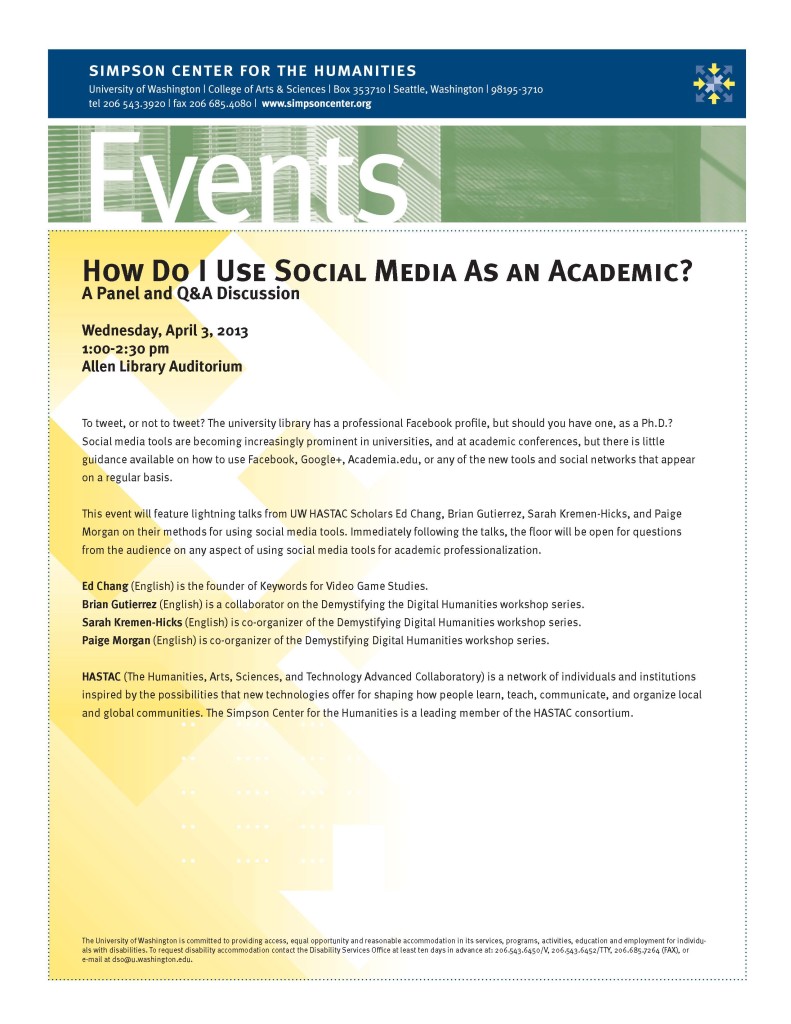
And at the end of the 2012-13 school year, I was the lead organizer for the Keywords for Video Game Studies’s end of school year colloquium in May 2013, which this year was a THATCamp (The Humanities and Technology Camp) called THATCamp Epic Play 2013.

For other sections of my portfolio, go to:
